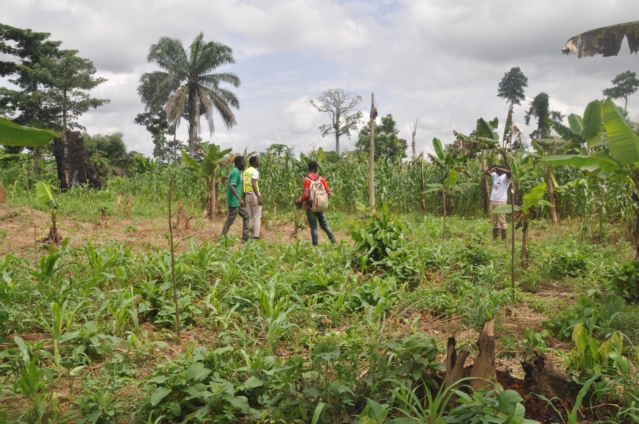A recent study conducted by a coalition comprising civil society and research organisations has indicated a 4% increase in global deforestation in 2022 compared to 2021.
This rise resulted in the loss of approximately 6.6 million hectares of forest.
The report underscored that the world is currently 21% behind schedule in achieving the goal of eliminating deforestation by 2030.
The study highlights that endeavors to safeguard primary tropical forests, which are renowned for their density and pristine nature, are lagging by 33%, with 4.1 million hectares lost in 2022. It is estimated that a substantial reduction of 27.8% in deforestation is required for the world to get back on track by 2023.
The assessment, which evaluated the progress of countries, companies, and investors in fulfilling commitments to eliminate deforestation and restore 350 million hectares of degraded land by 2030, revealed that global efforts to protect and rehabilitate forests have been progressing at an insufficient pace and, in certain instances, even deteriorating.

“The world’s forests are in crisis. All these promises have been made to halt deforestation, to fund forest protection. But the opportunity to make progress is passing us by year after year,” said Erin Matson, a lead author of the Forest Declaration Assessment and a senior consultant at Climate Focus.
Erin pointed out that attempts to halt deforestation were already behind schedule, and 2022 presented an opportunity to make up for the delay. However, once again, leaders did not meet expectations, and there is no room for further setbacks on the path to achieving zero deforestation by 2030.
“It’s now clear that halting deforestation will require sweeping changes to the economy — and that all of society has a role to play."
The yearly evaluation of global commitments, which includes the Glasgow Leaders' Declaration on Forests and Land Use (2021), monitors the progress of reducing forest loss compared to the average deforestation rate between 2018 and 2020, known as the "baseline level," with the aim of achieving zero loss by 2030.
The report also noted that in 2021, deforestation did slow down, but not to the extent required to align with the 2030 target. However, in 2022, there was a global increase in deforestation rates, pushing the world even further away from the desired trajectory.
Franziska Haupt, a lead author and managing partner at Climate Focus, provided a glimmer of hope, stating, "Hope isn’t lost, though." He mentioned that about 50 countries are making progress toward ending deforestation within their borders. He cited major rainforest nations like Brazil, Indonesia, and Malaysia, which have demonstrated significant reductions in forest loss.
“The reforms it takes aren’t pie in the sky, and these countries set clear examples that others must follow. But the challenge is great: globally, we will need to reduce deforestation by 27.8% to be on track in 2023.”
Across the tropics, progress on eliminating forest loss was off track in 2022, the report said. Forest loss increased by 8% from baseline levels in tropical Latin America and the Caribbean, with Brazil and Bolivia faring poorest. (The data do not yet reflect Brazil’s deforestation reductions in 2023.) In contrast, deforestation decreased by 18% from baseline levels in the tropical countries of Asia, with Malaysia and Indonesia meeting their interim goals for 2022.
Agriculture, including cattle ranching, soy production, palm oil, and smallholder farming, remains the leading driver of forest loss in tropical areas. Road expansion, fires, and commercial logging also contribute to the destruction and degradation of these forests.
Primary forests in tropical regions saw a 6% increase in loss in 2022 compared to baseline levels, with none of the three tropical forest regions — tropical Africa, tropical Asia, and tropical Latin America and the Caribbean — on track to halt the loss of these invaluable forests.
The report also provides a comprehensive assessment of progress in protecting temperate and boreal forests, focusing on degradation, which poses an ongoing threat to all forests. The findings reveal significant and widespread degradation in all regions, underscoring the risks to forest biodiversity, stored carbon, and ecosystem resilience, even in regions with low outright deforestation.
The assessment emphasises the need for developed countries to enhance protection against forest degradation, often arising from logging practices and climate change. Notably, some nations are taking steps to address these issues, such as Canada, which is working on defining forest degradation to improve monitoring and reporting.
“While we must applaud any success, progress in some countries or regions was undercut by failures to reduce forest loss in other countries,” added Haupt.
“All countries need to take responsibility: They need to limit their deforestation and degradation footprint at home and abroad, and they need to collaborate and support developing countries in this endeavor.”
Latest Stories
-
God makes rulers, not you; you can’t choose your successor – Mahama to Akufo-Addo
20 mins -
Contributors own SSNIT, they must decide who becomes its Director-General – Austin Gamey
1 hour -
Move away from theory-based learning towards practical learning approaches – AUCC President to students
1 hour -
Haaland scores as Manchester City beat Nottingham Forest
2 hours -
Villas-Boas elected Porto president
3 hours -
Situation on frontline has worsened, Ukraine army chief says
3 hours -
US doctor describes witnessing starvation in northern Gaza
3 hours -
CAFCC: RS Berkane make final after USM Alger refused to play 2nd leg over Moroccans’ jersey
3 hours -
Elon Musk in China to discuss enabling full self driving
3 hours -
PSG clinch Ligue 1 title after Lyon’s win over Monaco
5 hours -
Guinness Ghana sets the pace at Ghana Beverage Awards with six awards
5 hours -
Burkina Faso suspends BBC, VOA radio broadcasts over killings coverage
6 hours -
Nicole Kidman honoured with AFI Life Achievement Award
6 hours -
Brassier scores winner for Brest as they edge Rennes to secure European football
6 hours -
Akufo-Addo jabs Ejisu independent candidate; rubbishes allegations to rig by-election
6 hours

